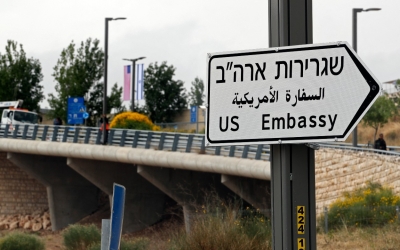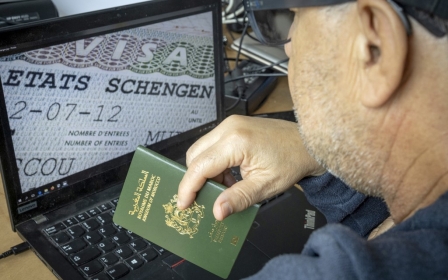Israel's acceptance into US visa waiver programme tied to 'reciprocity'

Israel’s acceptance into a US visa waiver programme is tied to “reciprocity” that allows Palestinian Americans access to free travel in Israel and the occupied Palestinian territories, the US ambassador to Israel said on Wednesday.
Israel has been trying to enter the programme for years. The waiver allows foreign travellers to visit and stay in the US for 90 days visa-free, granting US citizens the same right in other countries. The US currently has such agreements with 40 countries.
The US is expected to announce soon whether the number of Israeli visa applicants rejected by the US is below three percent, a basic condition to be accepted into the programme, Nides said.
But Israel’s bid has been stymied by stringent restrictions it imposes in the occupied Palestinian territories and Israel, curtailing freedom of travel.
US citizens with Palestinian ID cards or US citizens simply married to a Palestinian ID card holder are sometimes required to obtain a permit from Israeli authorities to travel between the West Bank or Gaza and Israel.
Israel currently prevents individuals registered in the Palestinian Authority population registry, including those without a Palestinian ID card, from entering Israel without advance permission, regardless of their US citizenship. Instead, they are required to enter and depart the occupied West Bank through the Allenby Bridge crossing with Jordan.
“We have to be clear about reciprocity. Reciprocity will mean that Palestinian Americans will be able to freely travel from Detroit to Ben-Gurion (Israel's main airport) to Ramallah," Nides told Ynet Radio.
"And Americans who live in Ramallah will be able to go from Ramallah to Ben-Gurion back to Detroit," he added.
'Discrimination'
Some US lawmakers have raised concerns about Israel being allowed into the visa waiver programme while it engages in what they deem discriminatory practices against US citizens.
“The issue is American visitors and whether an American visitor would be discriminated against based on their ethnicity or race,” Democratic Senator Chris Van Hollen said in September.
“It is pretty clear to me that if you are a Palestinian American, you will have different treatment if you want to travel to the West Bank than if you are another American who wants to go visit a settlement on the West Bank … That is not reciprocity. That is unequal treatment of American citizens based on their ethnicity.”
US President Joe Biden told former Israeli Prime Minister Naftali Bennett in August that he was prioritising the visa waiver initiative, but since then Israel has taken steps that could complicate its approval.

As part of new regulations imposed by Israel’s defence ministry in October, people born in Jordan, Egypt, Morocco, Bahrain, and South Sudan are barred from travelling to the occupied West Bank except under exceptional circumstances, even if they are US passport holders.
Israel has promised some steps to ease travel measures under pressure from the Biden administration, such as allowing nearly full-time operations at the Allenby crossing starting in April.
It’s unclear, however, if Israel’s new government under Prime Minister Benjamin Netanyahu will follow through on that pledge, amid heightened tensions with Jordan.
In October, twenty progressive House lawmakers sent a letter to Secretary of State Antony Blinken, arguing that Israel should not be accepted into the waiver programme because of its onerous travel restrictions on US citizens.
Other bipartisan lawmakers have urged the White House to see it through, saying that it will boost tourism and national security between the two allies.
Middle East Eye delivers independent and unrivalled coverage and analysis of the Middle East, North Africa and beyond. To learn more about republishing this content and the associated fees, please fill out this form. More about MEE can be found here.





